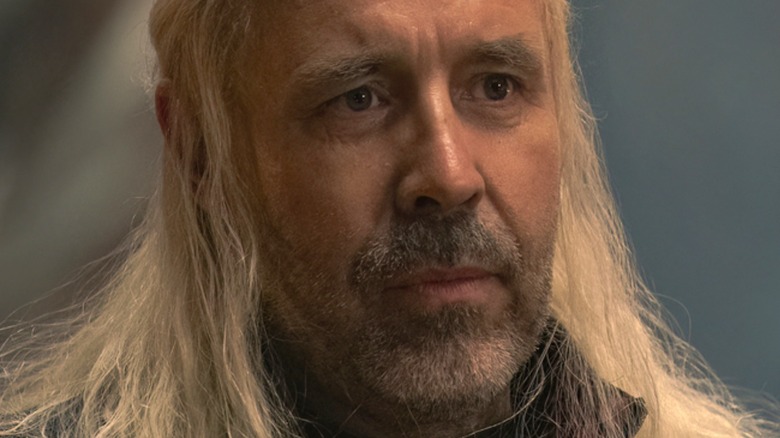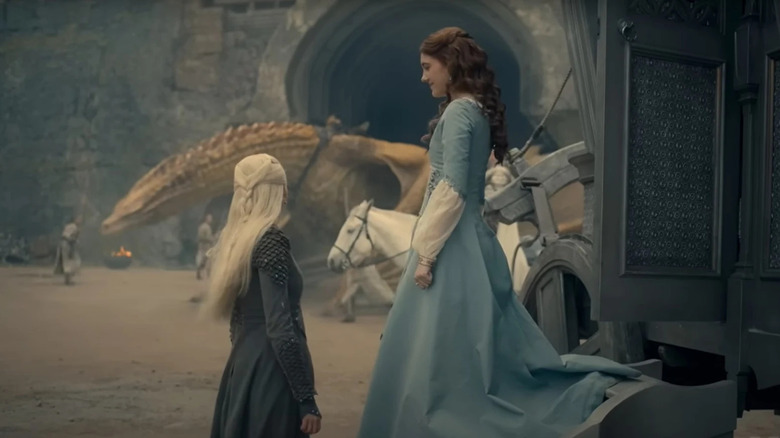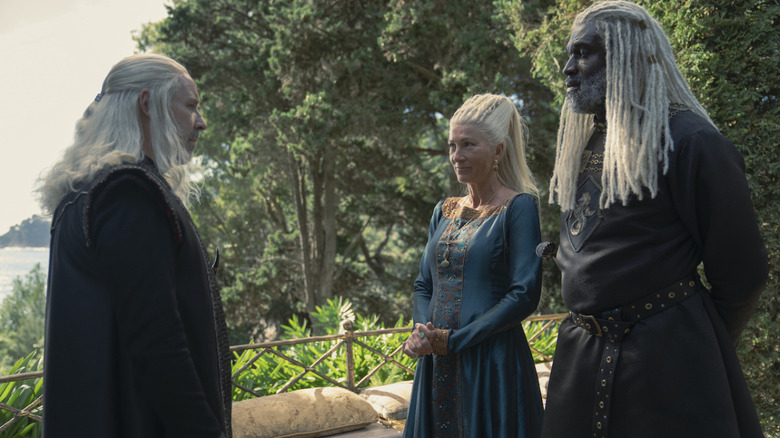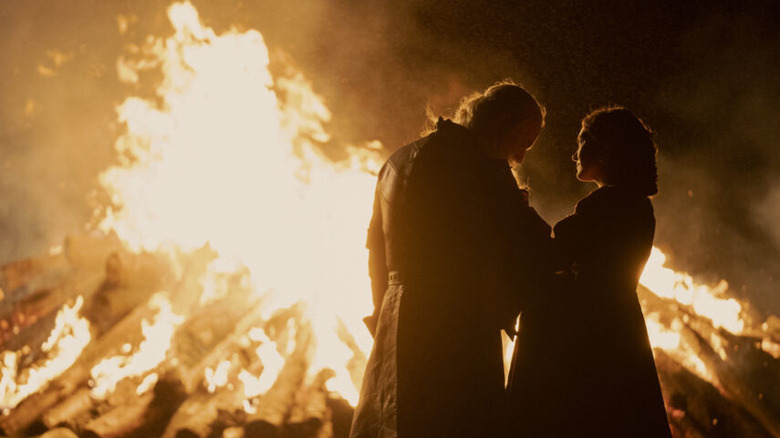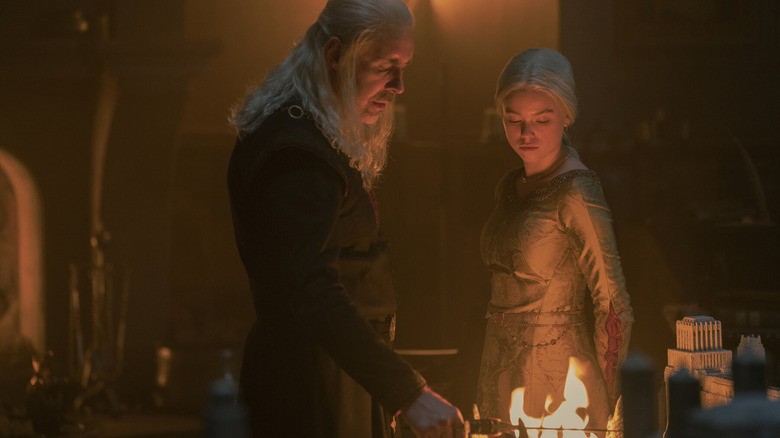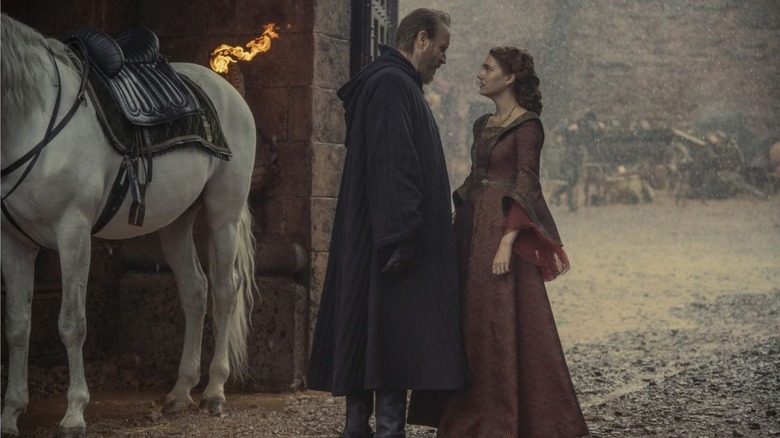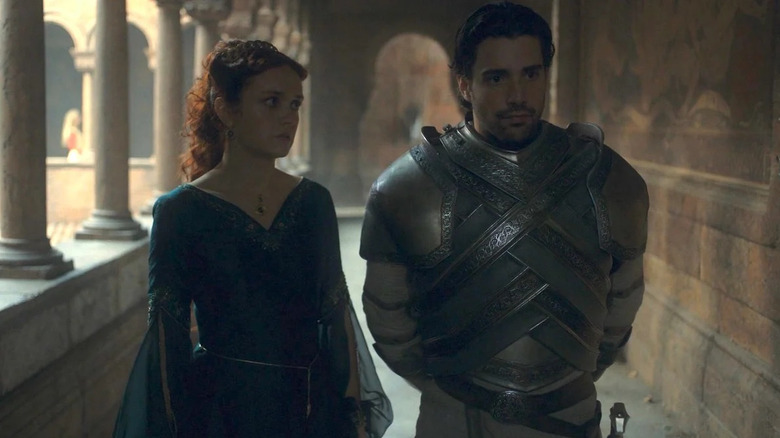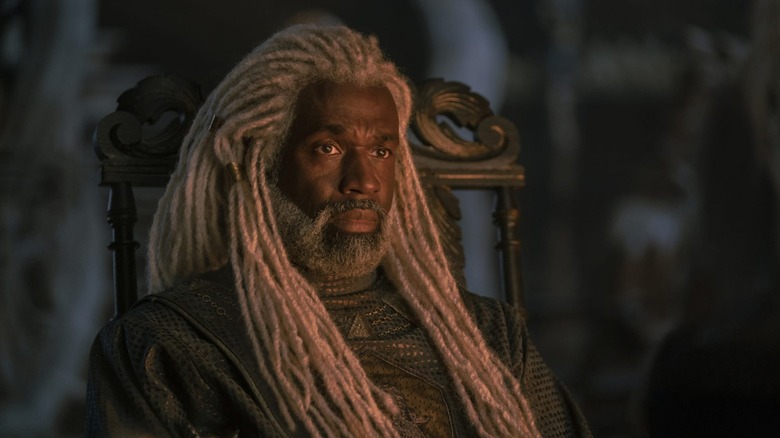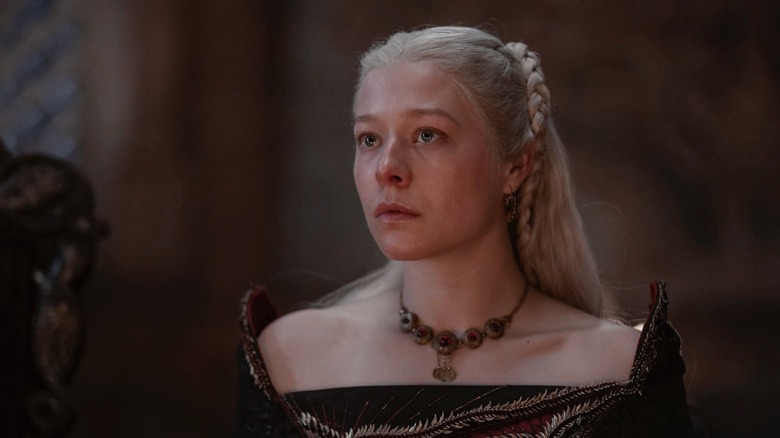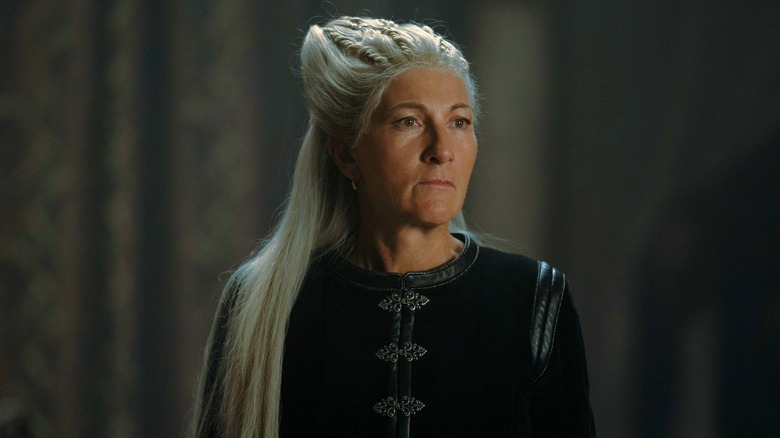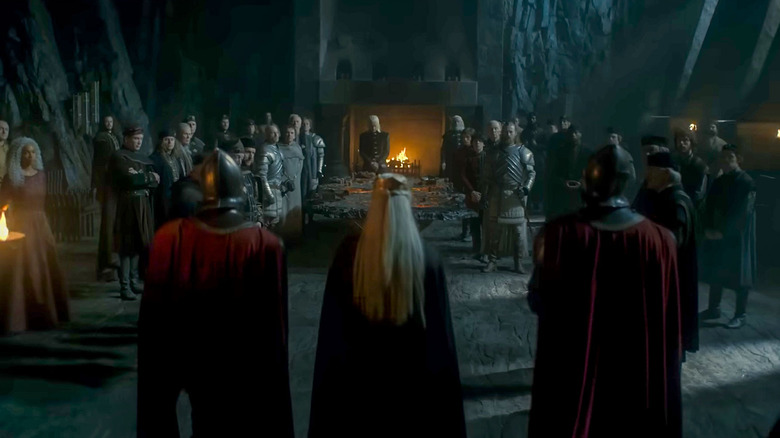Lines In House Of The Dragon Season 1 That Mean More Than You Think
HBO's "Game of Thrones" prequel, "House of the Dragon," continues the franchise's tradition of combining epic action and production design with richly drawn characters and multilayered writing. Fans of George R. R. Martin's books, upon which both shows are based, would expect nothing less. Though they differ greatly in style and scope, Martin's "A Song of Fire and Ice" series and "Fire & Blood" use the author's fantastical historical setting to delve deep into some thorny philosophical issues. Kings, queens, and those in their inner circles hash out the nature of duty, honor, and power as they try to seize it for themselves. It all makes for some conversations in dimly lit palace rooms that are every bit as exciting as those dragon battles.
"House of the Dragon" contains many direct references to the source material which serve as fun Easter eggs for book readers. For example, Otto charges that Daemon "would be a second Maegor, or worse," as he does in "Fire & Blood." Likewise, Queen Alicent mocks Laenor for the looks of his supposed children with the barb, "Do keep trying ... sooner or late you'll get one that looks like you." However, writers of the TV series have also taken the opportunity to flesh out characters who don't get as much word count as their "Game of Thrones" descendants. In fact, Season 1 of "House of the Dragon" has only covered about 50 pages of the novel.
Overall, however, the dialogue in "House of the Dragon," which is equal parts sparkling and stinging, is full of prophecy and irony. Here are ten lines that mean more than you might think.
I believe I'm quite content as a spectator.
While "House of the Dragon" writers had the good sense to keep some of the most memorable quotes from "Fire & Blood" word-for-word in the dialogue, they also smuggled several secret clues into what might seem like script filler. One extremely loaded example is Alicent's very first line of the series. Rhaenyra lands Syrax in the Dragonpit where Alicent and Ser Harrold Westerling are waiting for her. Westerling quips, "Every time that golden beast brings you back unspoiled, it saves my head from a spike." This is a foreboding line in and of itself, as we know the safe return of dragonriders cannot be assumed once the Dance of the Dragons begins. "She'll soon be as large as Caraxes," Rhaenyra says, then she turns her attention to her best friend. "That's almost large enough to saddle two."
Alicent's reply? "I believe I'm quite content as a spectator, thank you." Taken literally, she's telling the Princess that she has no interest in dragonriding. It's a way to politely decline her superior's offer. However, as a harbinger of what's to come, this is one of the most ironic statements of the entire season. Before the premiere episode is over, Alicent's father, Otto Hightower, will set in motion her seduction of the King and the subsequent rise of his own House. While Alicent is a child at this point and too young to be considered a willing participant, by the time she's Queen and a mother of four (we're yet to meet her youngest child, Daeron), she's absolutely an active contestant in the "ugly game" she and Otto are playing.
To elude a storm, you can either sail into it or around it, but you must never await its coming.
As the characters in "House of the Dragon" often remind us, the Targaryens might control the sky and fire via their dragons, but the Velaryons control the sea. Corlys made his fortune on the open water and the family commands the navy, so it stands to reason their idioms would come from the wisdom of sailors. In Episode 2, the Master of Ships and his Princess wife try to explain to the King as diplomatically as possible that the people see him as indecisive. His advice: "To elude a storm, you can either sail into it or around it, but you must never await its coming."
Specifically, he's speaking about the Triarchy and the need for Viserys to form an alliance through marriage. More generally, Corlys is underscoring the King's fatal flaw. As supreme ruler — in matters ranging from his marriage to his military — he has the luxury and the burden of final say. However, Viserys tends to put off that responsibility, even though the problems on the horizon are clear for everyone to see. We know Viserys wants Rhaenyra to wear the crown, but he doesn't do anything to build support for her and ensure her succession.
Later, Laenor will offer Rhaenyra similar guidance. "A wise sailor flees the storm as it gathers," he tells her once the Greens have made King's Landing inhospitable for their brood. They retreat for Dragonstone, but Rhaenyra — with her knowledge of the prophecy — commits to the fight for the long haul, while Laenor and Qarl escape the storm for good.
Many in my line have been dragonriders. Very few among us have been dreamers. What is the power of a dragon next to the power of prophecy?
Viserys wants so badly to be worthy of the history books, but he's not much of a dragonrider or a warrior. Instead, he searches for identity in another gift Targaryens are known to possess. We learn in "House of the Dragon" that Aegon I wasn't just a conqueror — he was a dreamer. It's this second quality that Viserys believes might define him.
"Many in my line have been dragonriders. Very few among us have been dreamers," he drunkenly tells Alicent in Episode 3. Then he asks rhetorically, "What is the power of a dragon next to the power of prophecy?" In part, this is the dragonless King's way of buttressing his own self-esteem, but it's also the reason why Viserys is so indecisive. If Viserys can rely on divine intervention to tell him what to do, not only does that make him special, it makes his job as monarch easier. He's devastated when his own dream about his and Aemma's son proves false (though it comes true in a sense with Aegon II) and costs him his wife.
The inherent tragedy in Viserys's yearning to be a dreamer is that he was actually much wiser than he gave himself credit for — he just needed confidence in his convictions. It's also tragic that his daughter Helaena is blessed with the gift of prophecy but cursed that no one will listen.
The truth does not matter, Rhaenyra. Only perception.
King Viserys acts like an overwhelmed single parent struggling to raise a teenage daughter, but he's a much better girl dad than even most modern-day daughters could hope for. It's incredibly progressive that he chooses Rhaenyra as his heir, which is also a symbolic correction of the slight that was committed against Rhaenys. It's also impressive that — once they get over their grief about Aemma and their awkwardness about the fact that he marries her best friend — Viserys talks to Rhaenyra the same as he would've talked to the son he once so desperately wanted.
After Rhaenyra's wild night out, Otto's accusations, and Daemon's (dishonest) confirmation, viewers may have expected the King to give the Princess an old-fashioned talking-to. Instead, he teaches her a kingly lesson. He acknowledges that the double standard for men and women — especially royal men and women — isn't fair when it comes to sex, and crucially, he doesn't shame her. Rhaenyra's correct that, if she was a prince, she could father a dozen bastards (as Aegon II does) and no one would blink an eye. In saying, "The truth does not matter, Rhaenyra. Only perception," Viserys is telling his daughter that she must be calculated, not necessarily chaste. In a broader sense, he's telling her to control her own narrative.
The King's wisdom about truth and perception is also a nod to the style in which "Fire & Blood" is written. It's full of what are probably half-truths from the perspective of the people who got to control the narrative.
Either you prepare Aegon to rule or you cleave to Rhaenyra and pray for her mercy.
After Episode 4's life lesson, Rhaenyra manages to get Otto booted from his job as Hand of the King, which presumably makes the next decade of her life a little easier to bear. However, before he leaves for Oldtown, Otto puts a thought in Alicent's head that all but assures the Targaryen civil war will happen. "The time is coming," he says ominously. "Either you prepare Aegon to rule or you cleave to Rhaenyra and pray for her mercy." He convinces his daughter that if Rhaenyra makes it to the Iron Throne, she'll have to kill Alicent's children to stay there.
By the end of Episode 5, the Queen will make her grand entrance in a Hightower green dress, effectively throwing Aegon II's hat into the ring and calling on Oldtown's allies to support him. Still, Alicent never goes to any effort to confirm whether Otto's words were true. She just accepts them as true, though Rhaenyra has never said or done anything to suggest she'd resort to such tactics. Had Alicent stayed close enough to her former friend to confide in her — instead of the men who seek to manipulate her — she might have seen that her conniving father presented her with a false choice. Her assumption is even more tragic when we see Aegon isn't exactly thrilled about the prospect of being King — until he feels love for the first time from the assembled crowd, that is. In the show, at least, it's Otto's hunger for power and paranoia that sets a terrible fate in motion.
I have to believe that in the end, honor and decency will prevail.
The vast majority of George R. R. Martin's characters exist in moral gray areas. Case in point: audiences root for Daemon, and he's killed at least four people. So why does Queen Alicent get so much hate? It's simple, really. She's a self-unaware hypocrite. Otto and Larys are quite comfortable saying and doing far worse things than the Queen would ever dream of, but at least they're intellectually honest about it.
When we're reintroduced to Alicent after the time jump, she's demanding to see Rhaenyra's baby before the poor mother has even passed the afterbirth. Alicent acts as though the parentage of the Princess's children offends her. "I have to believe that in the end, honor and decency will prevail," she vents to Criston. Yet there's nothing honorable or decent about the way she's just treated Rhaenyra, and we soon find out how horrendously lacking in honor and decency her son is. Even the person to whom she's speaking — the equally hypocritical Ser Criston — is vengeful and violent.
Parents shouldn't always be blamed for their children's behavior, but Aegon II is very much a product of his mother and grandfather's win-at-all-costs fixation with the Iron Throne. Ostensibly, she fell out with Rhaenyra over the Maester's tea, but she serves the same tea to Aegon's rape victims to hide his crimes. That's but one example of a lifetime of Alicent's excusing the bad behavior of men. It's not honor and decency that Alicent hopes will prevail — it's her own bloodline.
History does not remember blood. It remembers names.
A slight difference between "Fire & Blood" and "House of the Dragon" is that in the book, the true father of Rhaenyra's boys is more ambiguous. The show's casting makes it less so, which changes the calculus when it comes to Corlys and Rhaenys's allegiance to the Blacks. In a private conversation with her husband after their daughter's funeral, the ruling couple of Driftmark mulls over the question of the succession of the Driftwood Throne and the legacy of their family. Rhaenys lobbies for Laena and Daemon's daughters, Baela and Rhaena, who unquestionably share at least half of their DNA, while Corlys plans to stick with Lucerys Velaryon as his named heir. "History does not remember blood. It remembers names," is his argument, as staying the course means a Velaryon will be next in line to the Iron Throne.
Corlys ultimately may have been correct in taking the long view. "Fire & Blood" is a history of the Targaryen family. Jace, Luke, and Joffrey's paternity are questioned, but Archmaester Gyldayn, a fictional scholar and the narrator of the novel, has no way of confirming the paternity of Rhaenyra or anyone else's children. Well-known scandals of the day sometimes show up in conflicting accounts, but "Fire & Blood" is an example of history being written by the victors — or at least the characters who made themselves important enough to the story. Corlys Velaryon ends up being among them. His point of view isn't just his way of preserving his name and place in Westeros's public record. It's another subtle nod to the unique premise and writing style of the source material.
I'll return on dragonback.
The last supper of King Viserys in Episode 8 is a moving recreation of a similar scene from the book. In "Fire & Blood," the Queen and the Princess swap color palettes as a gesture of goodwill to appease the aging, ailing King, but there's no real proof in the text that the two sides ever actually attempted to bury the hatchet. Not so in "House of the Dragon." They may not have had time to shop for black and green dresses, respectively, but Alicent and Rhaenyra make genuine attempts to heal old wounds — even if Alicent's sons can't help themselves from pouring salt on them again. After Aemond's purposefully mean-spirited toast to his nephews, the younger Targaryen generation gets into yet another scuffle and Rhaenyra decides it's time to head for home. "You've only just arrived," Alicent says as she clasps the Princess's hands apologetically. "Let me see the children home," Rhaenyra replies. "I'll return on dragonback."
This is another instance of what sounds like an innocuous response to a nicety, but book readers know that there's something dark and deeply ironic about her choice of words. Though she isn't aware of it at the dinner party, once her half-brother, Aegon II, usurps her throne, the looming threat of the Black Queen's return to King's Landing on the back of her dragon, Syrax, is exactly what the Greens and the small folk will fear.
You toil still in service to men. Your father, your husband, your son. You desire not to be free, but to make a window in the wall of your prison.
In what might be the best line of the season, Princess Rhaenys lets Alicent Hightower know exactly how she feels about her behind-the-Throne machinations. Alicent's taken aback that her allies on the small council have been plotting a coup regardless of the King's final words. Still, she goes along with those plans anyway — save for the murder of Rhaenyra's family. The servants are rounded up into prison cells and Rhaenys is locked in her room. When Alicent pays her a visit, Rhaenys quickly surmises that the Greens are usurping. Alicent tries to win her to their side by flattering the Queen Who Never Was, besmirching Rhaenyra, and suggesting how virtuously the Greens would rule.
"And yet you toil still in service to men," Rhaenys says as she leans in close. "Your father, your husband, your son. You desire not to be free, but to make a window in the wall of your prison." With this statement, Rhaenys is accusing Alicent of propping up the patriarchy that kept her from the Throne. She's also warning her that by clinging to a traditional role and letting men rule she'll only ever have proximity to power. Alicent may think she can control the horrible men in her orbit (Aegon II, Aemond, Otto, Criston, Larys), but from her subservient position, she'll always be subject to their whims and vices. Rhaenys has serious reservations about Rhaenyra as a person, but as we see in Episode 10, she respects her politically.
It's no easy thing for a man to be a dragonslayer. But dragons can kill dragons, and have.
Episode 10 is the most closely lifted from the text, but with some differences in interpretation. The Black Queen's council argues for a dragon assault on King's Landing. They're led by Daemon, who believes with their advantage they could have the Greens' heads on spikes within the month. "It is no easy thing for a man to be a dragonslayer. But dragons can kill dragons, and have," he says and adds that the histories support his course of action. "When dragons flew to war, everything burned," Rhaenyra reminds him. "I do not wish to rule over a kingdom of ash and bone." Though the Queen is wiser in this debate, her Prince is still literally correct and unintentionally prophetic about what will happen between Vhagar and Arrax.
Daemon delivers this line in "Fire & Blood," too, but there he's suggesting they use dragons strategically, so as not to waste their best resource. The show makes Daemon the aggressor and pits his read on what it is to be a Targaryen against Viserys and Rhaenyra's interpretation of the same question. He insists, "Dreams didn't make us kings. Dragons did," and physically threatens his wife for being a "slave to omens and portents" as her father was. However, the episode's climax proves Viserys right. "The idea that we control the dragons is an illusion," he tells Rhaenyra, a fallacy that doomed Valyria and will doom Westeros if the Targaryens don't learn from their past. By the day's end, Aemond and Lucerys will lose control of their dragons, which will launch the Realm into a war that will cost human and dragon lives alike.
